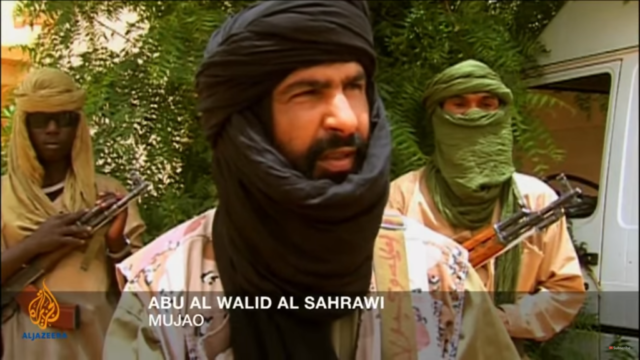
Briefs
Publication: Terrorism Monitor Volume: 14 Issue: 22
By:

MALI: ISLAMIC STATE CONSIDERS ITS ALTERNATIVES
Islamic State (IS) has acknowledged a pledge of allegiance from a fledgling group of Islamist fighters in Mali following several recent cross-border attacks by the group, and as IS itself comes under pressure in Iraq and Syria.
On October 30, the IS Amaq news agency broadcast the pledge by Adnan Abu Walid al-Sahrawi, a former fighter with the Movement for Oneness and Jihad in West Africa (MUJAO) and later with al-Mourabitoun. His so-called Islamic State in the Greater Sahara is behind two recent attacks in Burkina Faso: one in October on a military position near the northern border with Mali that killed five people, and one in September on a customs post in Markoye, which left two people dead (AP, October 12; Jeune Afrique, September 2; L’Info, September 6).
The acceptance of al-Sahrawi is something of a turnaround for IS. Previously, IS ignored a pledge he made in May 2015 as part of al-Mourabitoun (al-Akhbar, May 13, 2015). At the time, IS leadership likely saw little use for al-Sahrawi, and the al-Mourabitoun leader, Mokhtar Belmokhtar, disavowed the statement soon afterwards.
Possibly, the recent attacks have boosted al-Sahrawi’s standing with IS. They earned condemnation – along with other attacks in the region – from the Economic Community of West African States (NTA, October 21). The attacks have also prompted Burkinabe forces with the UN mission in Mali (MINUSIMA) to redeploy closer to their home border (Sidwaya, November 6).
But IS likely has another reason. Its new willingness to welcome al-Sahrawi comes as it watches territory it controls in Iraq and Syria being slowly reclaimed. In his first statement in nearly a year, supposedly made as Iraqi forces press in on Mosul, IS leader Abu Bakr al-Baghdadi attempted to rally his supporters. However, he also hinted that IS “provinces” elsewhere, which he termed the “pillars of the caliphate,” would have a greater role to play going forward (al-Jazeera, November 3).
As IS looks further afield, Mali in particular – where the government is struggling with Islamist attacks while trying to implement a shaky peace deal with rebel groups – looks promising (Sahel Intelligence, September 8). The Sahel has been largely dominated by al-Qaeda’s affiliates, but that could change. Islamic State has already succeeded in coopting a faction of Boko Haram in Nigeria, splitting the group (see Terrorism Monitor, August 19). IS fighters fleeing the bombardment of Sirte in Libya could choose to move into Mali, and a recent supposed truce there agreed to by al-Qaeda-linked Ansar Dine could open up space for IS expansion.
As IS faces defeat in Iraq and Syria, its franchises in places like Mali – and elsewhere, such as in Yemen where it has a well-established foothold – will likely receive even greater attention.
AFGHANISTAN: ‘SECRET’ TALKS WITH TALIBAN OFFER LITTLE PROMISE
Reports the Taliban has held two rounds of “secret” discussions with Afghan government officials have raised hopes that peace talks could be revived, but internal divisions within the group and the deteriorating situation in Afghanistan suggest such talks remain only a remote possibility.
The talks were held in September and October in the Taliban’s “political office” in Qatar, which the group has maintained since 2013. While the Taliban has issued no official confirmation on the subject, the Afghan government has since acknowledged they took place (ToloNews, November 7).
Present at the discussions were Mullah Abdul Manan Akhund, brother of the late Taliban founder Mullah Omar, and Afghanistan’s spy chief, Mohammad Masoom Stanekzai. The presence of Manan lends the talks some gravitas. He was brought into the Taliban leadership in recent months in a move aimed at healing rifts within the group (Afghanistan Times, September 16). A U.S. official was also present at the talks, according to British newspaper The Guardian, which first reported the discussions (The Guardian, October 18).
Peace talks with the Taliban have been at a standstill since former Taliban leader Mullah Akhtar Mansour was killed in a U.S. drone strike in May, but the group is unlikely to favor talks now at a time when they are enjoying success on the ground in Afghanistan. In the last month, the group has again made bloody gains in Kunduz. Meanwhile, local politicians in Uruzgan province report that Taliban fighters have besieged scores of Afghan troops for nearly two months (ToloNews, November 4; ToloNews, November 6).
Indeed, there appears to have been little progress in the Qatar discussions (Daily Times, October 19). Following the talks, however, the group dispatched three senior officials – including former Taliban ambassador Maulvi Shahabuddin Dilawar – to Pakistan (Express Tribune, October 23). The Taliban have played down that trip as a regular visit, but Pakistan appears not to have had a presence at the Qatar meeting and likely expected to be involved.
In recent months the Pakistani security services have arrested a number of Taliban leaders for reasons that are not wholly clear (Express Tribune, October 12). Some suggest the arrests may be aimed at pushing the Taliban towards peace talks. A less charitable view is that the arrests are a warning to the group from the security services – a reminder to the group’s leadership at a time when some in are calling for the group to break its ties with Pakistan (Khaama, October 22). Either way, with the Taliban’s divisions still not fully healed and the group redoubling its efforts on the ground, the prospect of peace talks remains far off.




